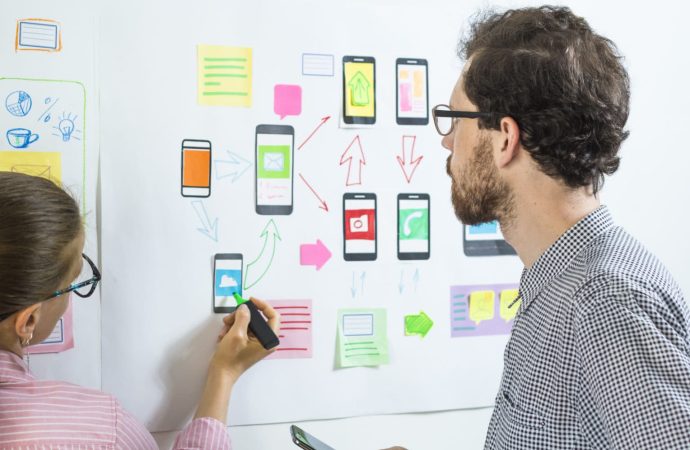5G Mobile App Development: Revolutionizing the Future of Connectivity The advent of 5G technology is reshaping the digital landscape, especially in mobile app development. As the fifth generation of wireless technology, 5G promises faster data speeds, lower latency, and the ability to connect billions of devices. For mobile app developers, this breakthrough opens doors to
5G Mobile App Development: Revolutionizing the Future of Connectivity
The advent of 5G technology is reshaping the digital landscape, especially in mobile app development. As the fifth generation of wireless technology, 5G promises faster data speeds, lower latency, and the ability to connect billions of devices. For mobile app developers, this breakthrough opens doors to innovative applications that can operate more efficiently and deliver experiences once considered futuristic. This article explores the benefits, examples, and real-world case studies of 5G Mobile App Development and delves into its future implications for industries and users alike.
1. Faster Speeds and Lower Latency

Image by Yandex.com
One of the most significant improvements 5G brings is its blazing speed—up to 100 times faster than 4G. This is particularly valuable for mobile apps, enabling instant downloads, seamless streaming, and uninterrupted performance. Moreover, 5G’s ultra-low latency—less than 1 millisecond—means apps can respond to user input almost instantaneously, making real-time interactions smoother than ever.
For mobile apps, this translates into:
- Enhanced User Experience: Apps that once required users to wait for loading screens or slow data transfers can now provide near-instant results. Video conferencing apps, for instance, can deliver high-quality streams with no buffering, even in 4K resolution.
- New App Categories: Real-time apps like mobile gaming, live sports, and interactive education can now be developed with confidence that they will function without delays or lag.
2. Enhanced Connectivity for IoT (Internet of Things)
The Internet of Things is expected to grow exponentially with 5G. This next-gen network supports massive machine-type communications, enabling up to 1 million devices to connect per square kilometer. For mobile app developers, this opens new avenues in sectors like smart homes, healthcare, transportation, and manufacturing.
The benefits include:
- Improved Device Communication: Apps can seamlessly control and interact with multiple devices, from thermostats and wearables to smart refrigerators and connected cars, without interruptions.
- Real-Time Monitoring: For example, healthcare apps connected to IoT devices can now monitor patients in real time, sending immediate alerts to doctors when abnormal data is detected, a critical advancement in patient care.
3. Improved AR/VR Experiences
Augmented Reality (AR) and Virtual Reality (VR) applications have struggled with latency and bandwidth constraints on older networks. With 5G, these limitations are removed. Developers can now create more immersive AR and VR apps that offer a smooth experience without disconnections or pixelation, even in mobile environments.
This allows for:
- Richer Gaming Experiences: Gamers can enjoy fully immersive environments with no latency, making VR gaming more mainstream. Mobile gaming apps like Pokémon Go could evolve into more sophisticated AR games that interact seamlessly with the real world.
- Innovative Learning Apps: Educational apps that employ AR/VR can offer interactive lessons, virtual field trips, and immersive training programs that are realistic and highly engaging.
4. Cloud and Edge Computing Integration
The rise of 5G brings a close relationship between mobile apps and cloud or edge computing. With faster data transmission, apps can offload processing tasks to edge servers or the cloud, reducing the need for powerful local hardware. This allows apps to run lighter on devices while accessing vast computational resources remotely.
The result is:
- Lighter Mobile Apps: App developers can create faster, more efficient apps that don’t need to store or process large amounts of data on the user’s device.
- Enhanced App Performance: For instance, apps like Adobe’s cloud-based photo editing tools or AI-driven apps can offload tasks like image rendering or complex data analysis to the cloud, reducing the strain on mobile hardware while delivering better performance.
5. AI and Machine Learning Capabilities

Image by Yandex.com
5G supports more complex AI and machine learning models by enabling faster data transfers and real-time processing. Apps that rely on AI—such as virtual assistants, recommendation systems, and voice recognition—can now operate with greater accuracy and speed.
This unlocks:
- Real-Time Personalization: E-commerce apps can offer personalized product recommendations on the fly, while AI-powered customer support systems can resolve user issues with minimal delay.
- Advanced Analytics: Mobile apps used in industries like finance and healthcare can now process vast datasets in real time, providing accurate forecasts, diagnoses, or risk assessments based on AI algorithms.
6. Autonomous Vehicles and Transportation
5G is critical for mobile apps that manage autonomous vehicles, drones, and logistics systems. The low latency and reliable connectivity of 5G ensure that these applications can make real-time decisions based on immediate data, making transportation systems safer and more efficient.
For example:
- Vehicle-to-Everything (V2X) Communication: Mobile apps can now facilitate real-time communication between vehicles, traffic signals, and road infrastructure, reducing accidents and improving traffic management.
- Autonomous Fleet Management: Logistics companies can use mobile apps connected to 5G to track and manage autonomous delivery vehicles or drones, optimizing routes and reducing operational costs.
Examples of Mobile Apps Benefiting from 5G
1. Gaming Apps
Mobile gaming has already begun to see the benefits of 5G with faster download speeds and lower latency. Take, for instance, cloud gaming apps like GeForce Now or Google Stadia, which allow players to stream high-definition games directly to their mobile devices without the need for expensive hardware. 5G ensures that these games run smoothly, even on high settings, providing console-quality experiences on mobile devices.
2. Healthcare Apps
Remote patient monitoring has been transformed by 5G. Apps connected to IoT devices, such as heart rate monitors or glucose meters, can now send real-time data to healthcare providers. Apps like AliveCor allow patients to take electrocardiograms from their smartphones, and with 5G, these readings can be transmitted instantaneously to their doctors for immediate analysis.
3. Retail Apps
Retail apps are leveraging AR to create interactive shopping experiences. For example, IKEA’s app lets customers visualize how furniture will look in their homes using AR. With 5G, the app can offer smoother, more accurate renderings, giving users a better shopping experience.
Case Studies on 5G Mobile App Success
1. Gaming Industry: Fortnite and Cloud Gaming
Fortnite has been one of the most popular games in the world, and with 5G, the experience has become even more immersive. Epic Games collaborated with cloud gaming platforms to allow players to access Fortnite on mobile devices with the same quality as they would on consoles or PCs. Using 5G, players can stream the game without performance drops, ensuring a lag-free experience.
2. Healthcare: Remote Surgery and Patient Monitoring

Image by Yandex.com
In China, the first remote surgery was successfully performed using 5G. Doctors controlled robotic arms from a different location, and 5G ensured that the commands were transmitted in real time. This case highlights the potential of 5G to revolutionize healthcare by enabling remote surgeries, patient monitoring, and telemedicine in a way that wasn’t possible with previous networks.
3. Retail: AR Shopping with Zara
Zara has introduced AR in its mobile app, allowing users to see how clothes fit using virtual models. The 5G network enables higher-quality visuals, smoother transitions, and real-time interaction, transforming the way people shop online. The success of Zara’s AR features highlights how 5G can bridge the gap between online and offline shopping.
Challenges in 5G Mobile App Development
Despite the numerous benefits, there are challenges to 5G app development:
- Infrastructure: While 5G is rolling out, it’s not available everywhere. Developers must consider whether their app’s target audience has access to 5G infrastructure.
- Privacy and Security: With increased data speeds and device connectivity, apps need to ensure that they protect users’ privacy and maintain security. Developers must be vigilant in using encryption and other security measures to safeguard data.
- Costs and Adoption: The high cost of 5G-compatible devices and network plans may slow down user adoption, limiting the immediate market reach of 5G-dependent apps.
Future of 5G Mobile Apps
The future of 5G mobile app development is filled with possibilities:
- Smart Cities: 5G will power smart city apps, allowing real-time traffic control, waste management, and energy efficiency through connected IoT systems.
- Autonomous Mobility: We can expect apps that support fully autonomous transportation, connecting self-driving cars and drones to manage traffic and logistics in urban environments.
- Expanded AR/VR in Education and Entertainment: AR/VR mobile apps in education, healthcare, and gaming will reach new heights, offering more interactive, immersive experiences that are limited only by imagination.
Conclusion
5G mobile app development is set to transform industries ranging from healthcare and gaming to retail and transportation. With faster speeds, lower latency, and enhanced connectivity, developers can build more powerful, responsive, and innovative apps that deliver seamless user experiences. While challenges exist, the future of 5G holds immense promise, and those who embrace this technology stand to gain a competitive edge in the ever-evolving digital landscape.
As 5G networks continue to expand, mobile apps will play a central role in how we interact with the world, making this an exciting time for developers and users alike.
















